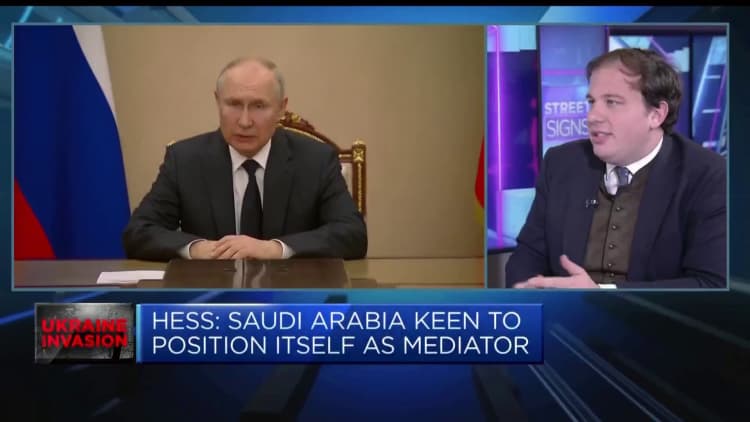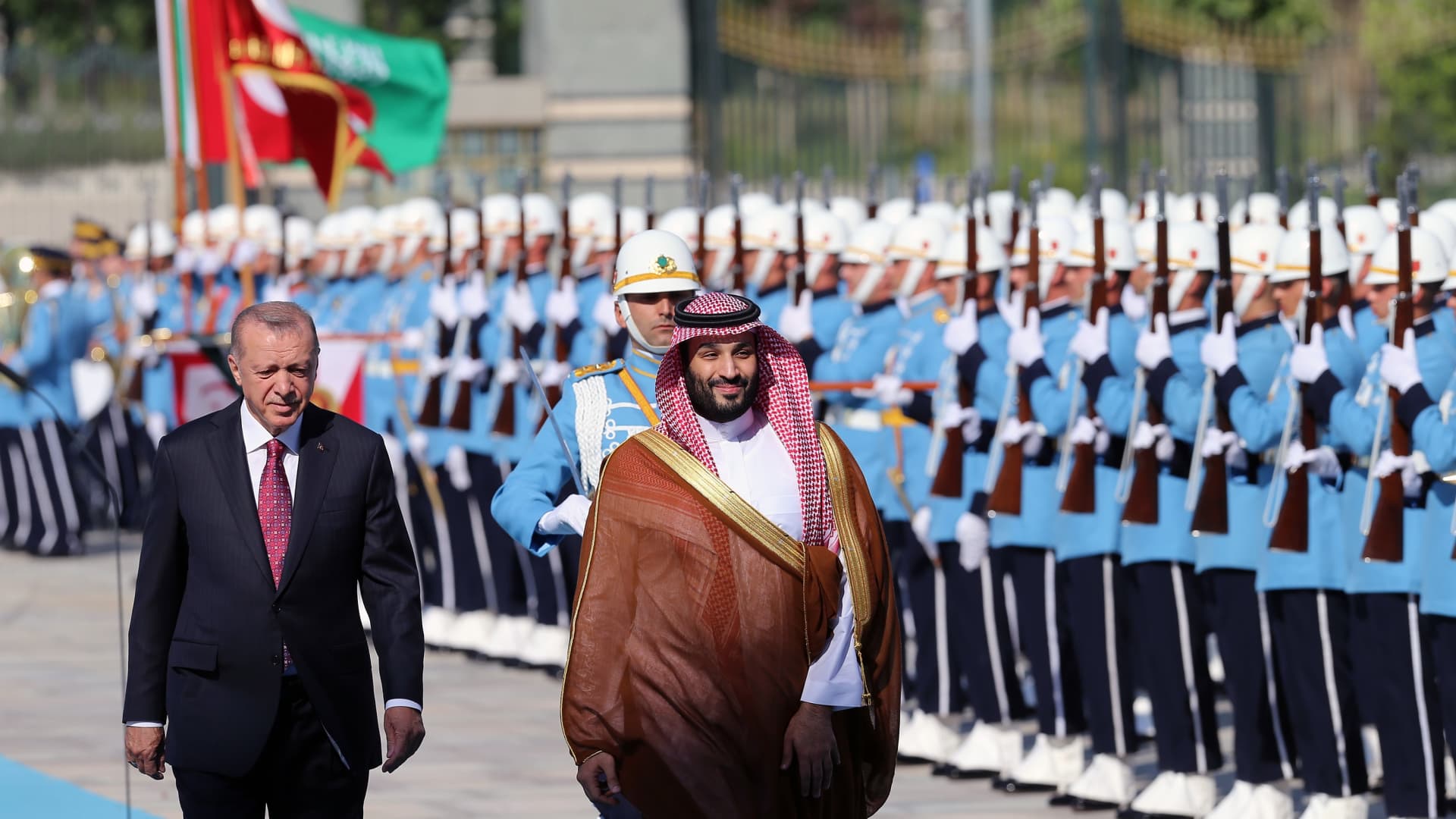Turkish President Recep Tayyip Erdogan welcomes Saudi Arabia’s Crown Prince Mohammed bin Salman Al Saud in Ankara, Turkey, on June 22, 2022.
Mustafa Kaya/Xinhua via Getty Images
Nearly 300 prisoners of war – both Ukrainian and Russian – faced death or indefinite detention in late September of 2022.
It was a fate that looked all the more real as Russian President Vladimir Putin announced the mobilization of some 300,000 Russian conscripts to fight on the Ukrainian front.
But on that very same day, the warring countries made the shock announcement that they had come to an agreement on a prisoner swap, which would release the detained fighters and political prisoners from their respective captors.
The sheer suddenness and size of the swap – the largest since Russia launched a full-scale invasion of its neighbor the prior February – came as a shock, and an immense relief to the family members of the detained.
But they ultimately didn’t have Russia or the West to thank. Behind the scenes, the hard negotiating work was overseen by two unlikely leaders: President Recep Tayyip Erdogan of Turkey and Crown Prince Mohammed bin Salman of Saudi Arabia.
Ukrainian President Volodymyr Zelenskyy presents state awards to Ukrainian defenders released from Russian captivity during a ceremony for 331 Ukrainian soldiers and policemen who were freed in a prisoner swap with Russia in Kyiv, Ukraine on December 2, 2022.
Ukrainian Presidency | Handout | Anadolu Agency | Getty Images
“I would like to thank the Turkish government for helping facilitate the exchange of prisoners between Ukraine and Russia, building on their leadership on the grain deal,” U.S. national security advisor Jake Sullivan wrote on Twitter at the time.
Saudi Arabia for its part brokered the return of 10 foreign nationals captured by Russia who had been fighting in Ukraine – two of which were American – thanks to the Saudi crown prince’s close relationship with Putin.
“We thank the Crown Prince and Government of Saudi Arabia for facilitating [the prisoner exchange],” Sullivan wrote in a separate post.
In the latest development, Saudi Arabia plans to hold a Ukraine peace summit in Jeddah to which Ukraine, the U.S., European nations, China, India, and Brazil among many others are invited. And it was reported in July that the Saudi and Turkish leaders are attempting to broker a deal to bring Ukrainian children forcefully deported by Russia back to their families.
Turkey, meanwhile, is trying to revive the crucial Black Sea grain initiative it brokered in mid-2022 between the warring countries. Its political heft as NATO’s second-largest military and its control over the Turkish straits, the only entry point from the Black Sea into the Mediterranean, gives it particular diplomatic leverage.
The rise of these so-called “middle powers” in mediating such large-scale conflict signals a new world where players beyond the U.S. and the West can call the shots, and where smaller states aren’t forced to tie themselves to either the U.S., Russia, or China.
A more multipolar world
These changes reflect “the rise of global multipolarity and mid-level regional powers with international roles,” Hussein Ibish, a senior resident scholar at the Arab Gulf States Institute in Washington, told CNBC.
“Saudi Arabia and Turkey are good examples of such mid-level powers now helping shape international realities in a way they rarely did during the Cold War.”
Both Turkey and Saudi Arabia are broadly seen as well-positioned brokers, given they both have good relationships with Russia’s Putin while at the same time being longtime allies of the West, through Turkey’s nearly 70-year-old NATO membership and through the Saudi kingdom’s more than 80-year-old security relationship with Washington.
Lithuanian Deputy Defence Minister Vilius Semeska poses with Selcuk Bayraktar, Chief Technology Officer of Turkish technology company Baykar, and Haluk Bayraktar, Chief Executive Officer of Baykar, next a Bayraktar TB2 advanced combat drone in Istanbul, Turkey June 2, 2022.
Baykar | Reuters
The diplomatic initiative, Ibish said, “helps solidify the Saudi-Turkish rapprochement and promote the image of these countries as significant global players, regional partners and more independent actors,” beyond their traditional institutional alliances.
The efforts are also in both countries’ interests; they want to increase their political clout, analysts say, while Saudi Arabia’s Crown Prince Mohammed bin Salman seeks to transform his kingdom’s image and status in everything from sports and tourism to diplomacy.
Still, Washington has criticized Saudi Arabia for curtailing oil production and keeping prices high, which helps Russian oil revenues that in turn finance the Ukraine invasion. And Turkey, like Saudi Arabia, refuses to partake in sanctions against Russia, irking its Western allies.
But maintaining independent positions helps both countries’ relationships with other powers like China as well as neutral states in the Global South like India and Brazil.
Saudi Arabian Crown Prince Mohammed bin Salman (R) meets Ukrainian President Volodymyr Zelenskyy (L) in Jeddah, Saudi Arabia on May 19, 2023. (Photo by Saudi Foreign Ministry / Handout/Anadolu Agency via Getty Images)
Saudi Foreign Ministry | Anadolu Agency | Getty Images
And Kyiv has reason to respect both mediators: Turkey supports Ukraine with substantial weapons and aid, while Saudi Arabia’s crown prince already invited Ukrainian President Volodymyr Zelenskyy to the kingdom in May so that he could be heard at the Arab League summit.
“Both Erdogan and Mohammed bin Salman are engaging in a bit of competitive mediator roles in which they are trying to improve their country’s national diplomatic stature by achieving humanitarian goals in the Russo-Ukrainian war,” said Ryan Bohl, a senior Middle East and North Africa analyst at Rane.
“By doing so, they hope to improve their country’s reputations in both the Global North and Global South.”
What can they actually accomplish?
Taking on the task of trying to mediate Europe’s largest land war since World War II requires realism; and Ankara and Riyadh have measured expectations for upcoming peace summits and negotiation attempts.
Turkey and Saudi Arabia “are among the actors which could help prevent further escalation in the Ukraine war,” Ibish said, “but it’s an exaggeration to think they are the main or only potential buffers.”
Ayham Kamel, Middle East and North Africa practice head at the Eurasia Group, says the upcoming Saudi-hosted peace summit is “unlikely to represent a serious step toward peace talks capable of ending the war in the near future.”
But, he added, it will “build a platform for more constructive engagement among the West and developing countries in the Global South.”


Many developing nations have largely refrained from taking a side in the war or even condemning the invasion, as they often have important trade or military relationships with Russia or simply have a historic distrust of the West.
Some, like Brazil, have also suggested that Ukraine cede territory to Russia to end the fighting – a proposition Kyiv categorically refuses.
“Riyadh is under no illusion that the August gathering will lead to a breakthrough on substance, and Western countries do not expect Global South participants to embrace the Ukrainian peace plan in its current form or be open to expanding sanctions against Russia,” he noted.
In a conflict where the stakes involve potential nuclear fallout, however, even limited diplomatic progress and communication is welcomed.
Since both the West and Russia are so far trying to avoid global escalation, they are also not heavily pressuring Riyadh or Ankara to take a side, Bohl said. “It still serves both NATO’s and Russia’s purposes for the two countries to have working relations between them.”
This story originally appeared on CNBC

